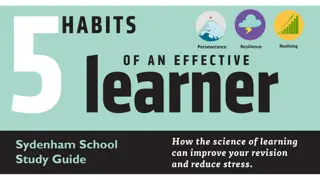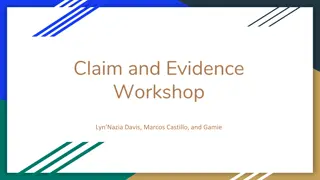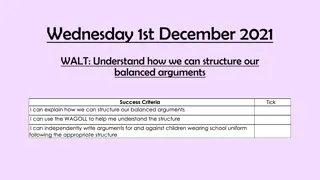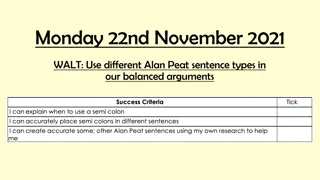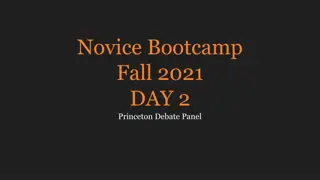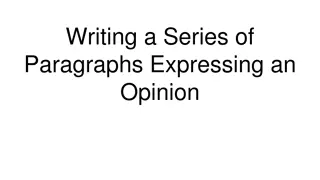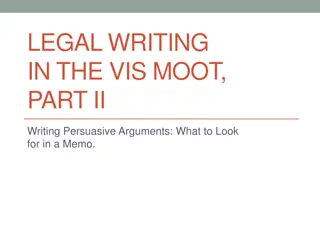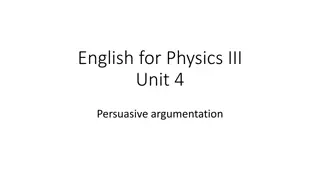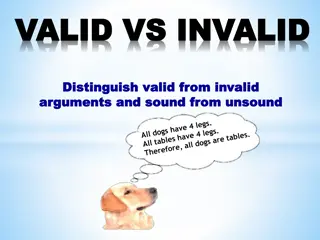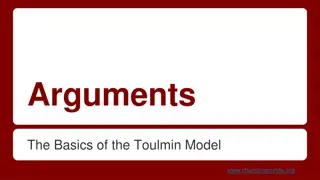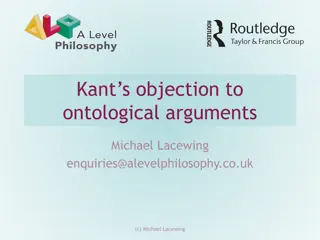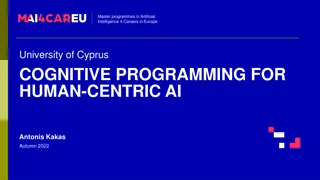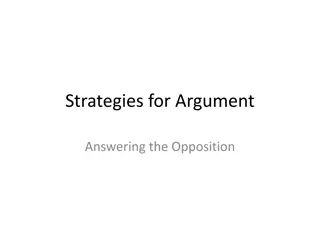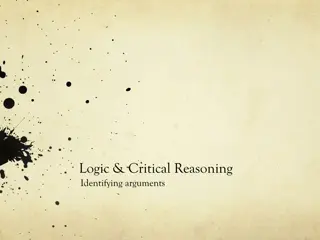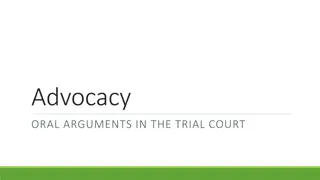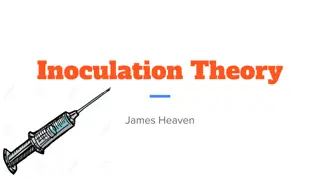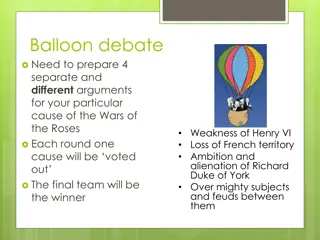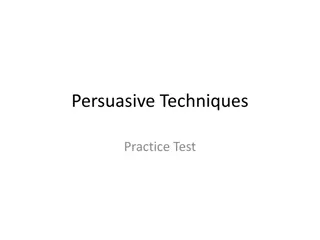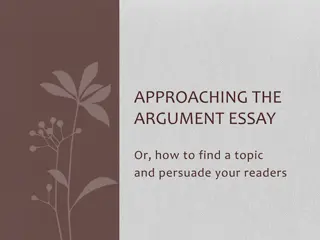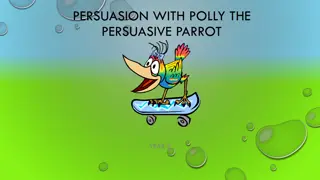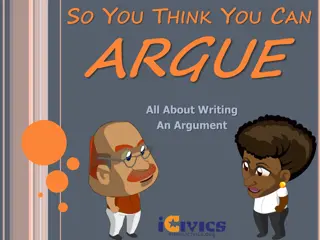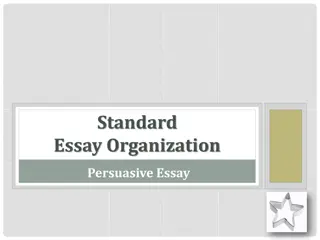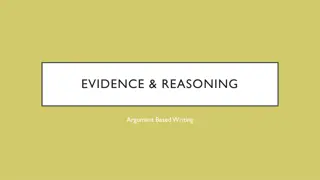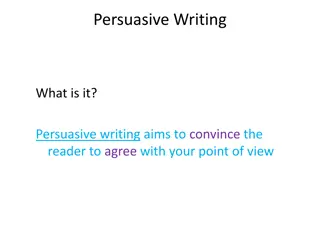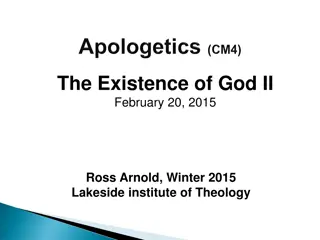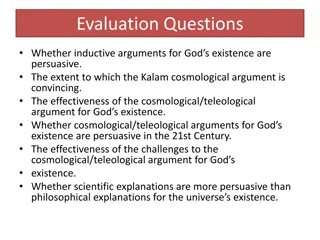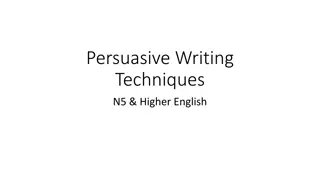Effective Revision Strategies for Year 8 English Summer Exams
Discover effective revision strategies for the Year 8 English Summer Exams, including retrieval practice, flashcards, mind maps, and persuasive writing techniques. Learn how to structure persuasive responses using AFOREST (logic/reason, credibility/trust, emotions/values) and identify key features i
4 views • 19 slides
Mastering the Toulmin Method for Constructing Persuasive Arguments
Learn how to effectively structure arguments using the Toulmin Method, which consists of Claim, Data, Warrant, Backing, Counterclaim, and Rebuttal elements. Explore reasoning and logic concepts, differentiate between inductive and deductive reasoning, and understand how to construct valid arguments
0 views • 30 slides
Understanding the Structure of Balanced Arguments
Explore the concept of using the third person in writing balanced arguments to maintain objectivity and structure. Learn about third person pronouns and the importance of being unbiased in your writing. Understand the significance of structuring your arguments and maintaining a clear order for effec
0 views • 11 slides
Mastering Alan Peat's Balanced Arguments with Different Sentence Types
Explore the use of various Alan Peat sentence types in crafting balanced arguments, focusing on incorporating semi-colons effectively. Engage in interactive activities and practice sessions to enhance your skills in creating compelling arguments. Dive into examples and exercises to refine your under
1 views • 12 slides
Mastering Debate: Essential Strategies and Techniques
Learn key concepts like argument structure, points of clarification, and how to make compelling arguments in a debate setting. Discover the importance of warrants, impacts, and implications in formulating strong arguments. Explore tips on coming up with effective arguments and understanding differen
0 views • 47 slides
Understanding Rhetoric: Ethos, Logos, Pathos in Persuasion
Rhetoric explores the art of persuasive communication, emphasizing three key components: Ethos (credibility), Logos (logic/facts), and Pathos (emotion). Understanding the three types of rhetoric and persuasive appeals can enhance one's ability to craft compelling arguments. Through examples, student
0 views • 10 slides
Mastering Final Focus in Debates
Final Focus, a crucial 2-minute speech at the end of a debate, serves as your last chance to persuade the judge of your victory. It involves comparing key voters and emphasizing the impact of your arguments. Weighing key voters is essential, with a focus on demonstrating why the scale tips in your f
1 views • 4 slides
Exploring Current Social Issues and Persuasive Writing
Discover how to craft a compelling Higher Persuasive Folio essay by brainstorming persuasive topics and diving into current interesting issues. Avoid banned topics and focus on honing persuasive techniques for a successful essay.
2 views • 36 slides
Mastering Academic Writing: Moves that Matter in Response
In the academic writing realm, transitioning to the "I Say" stage can seem daunting, but it's crucial for building effective arguments. This stage focuses on three key ways to respond - agreeing, disagreeing, or sharing mixed opinions. It emphasizes the importance of clear and direct responses to en
2 views • 21 slides
Should Students Have Homework? Crafting a Persuasive Argument
Crafting a persuasive argument on the topic of whether students should have homework, this piece presents a well-structured approach for expressing an opinion effectively. It guides the reader through forming an introduction with a clear position, developing supporting points in body paragraphs, and
0 views • 10 slides
Mastering Persuasive Legal Writing: Tips for Effective Memo Crafting
Crafting a persuasive legal memo involves structuring your arguments with clear headings, following the IRAC method, maintaining logical paragraph structure, providing examples, and ensuring proper citations. By emphasizing argument clarity, structure, and support, you can elevate the impact of your
0 views • 10 slides
Understanding Reasonable Arguments vs. Pseudo-Arguments
The provided content focuses on distinguishing between reasonable arguments and pseudo-arguments through thought-provoking questions such as the ethical treatment of animals, city subsidies for sports venues, and subjective opinions on aesthetics. It also explains the structure of an argument, highl
0 views • 18 slides
Exploring Energy Sources and Arguments in Physics III Unit 4
Delve into persuasive argumentation techniques with connectors like "despite," "although," and "even though" in English for Physics III. Practice constructing strong arguments and evaluating different perspectives on energy sources through discussions and listening exercises. Explore the effectivene
1 views • 32 slides
Understanding Valid and Invalid Arguments in Logic
In logic, arguments consist of premises supporting a conclusion, with deductive arguments claiming logical necessity. Valid arguments have premises implying the conclusion, making them deductively valid. For example, if all actors are robots and Tom Cruise is an actor, then logically Tom Cruise must
0 views • 25 slides
Mastering Claims, Evidence, and Warrants for Persuasive Writing
Understanding the concepts of claims, evidence, and warrants is crucial for constructing persuasive arguments. Claims represent positions to persuade, evidence supports claims with facts, and warrants bridge the gap between evidence and claims. An exercise is outlined to help practice forming claims
0 views • 8 slides
An Examination of Ontological Arguments for God's Necessary Existence
Various ontological arguments, such as Malcolm's and Anselm's, propose that the existence of God is logically necessary, grounded in the concept of God as the greatest possible being. These arguments challenge the coherence of the concept of God and counter objections, like Kant's claim that existen
2 views • 10 slides
Creative Teaching Approaches for Persuasive Writing Workshop
The workshop focuses on using Grammar for Writing principles to enhance teaching of persuasive writing, emphasizing modal verbs and adverbials. It encourages creative writing by engaging young writers' imaginations and beliefs, allowing freedom to explore ideas. Participants learn key teaching princ
0 views • 51 slides
Understanding the Toulmin Model for Effective Argumentation
The Toulmin Model provides a structured approach to crafting and evaluating arguments, consisting of key components like claims, grounds/data, and warrants. It emphasizes the importance of using evidence and reasoning to support claims effectively. By understanding this model, one can enhance the pe
0 views • 13 slides
Kant's Critique of Ontological Arguments
An exploration of Kant's objection to ontological arguments, examining the flaws in the reasoning of Anselm and Descartes. Kant argues that existence is not a predicate and does not enhance the concept of a being. Therefore, ontological arguments cannot prove the existence of God solely through conc
0 views • 7 slides
Understanding Argumentation and Realization in AI Master Programmes
Exploring the concept of argumentation and its realization in artificial intelligence master programmes, focusing on the construction, evaluation, and implementation of arguments through cognitive programming. The framework involves structured argumentation, conflict relations, and strength/preferen
1 views • 31 slides
Strategies for Answering Opposition in Argumentation
Utilize various strategies to effectively counter opposing viewpoints in arguments, including analogy, classification, comparison/contrast, definition, description, example, humor, narration, problem/solution, and reiteration. Analyze model arguments by summarizing claims, evaluating supporting poin
0 views • 15 slides
Understanding Logic and Critical Reasoning: Identifying Arguments
In the study of logic and critical reasoning, identifying arguments is a fundamental task. Arguments consist of premises supporting a conclusion, and they can be identified by specific indicators and techniques. Understanding argument structure and types of support, such as deductive and inductive,
2 views • 15 slides
Guide to Oral Arguments in Trial Court
Learn how to conduct oral arguments in a trial court, including the steps for both the movant and respondent, strategies for making strong arguments, and tips for responding effectively. This comprehensive guide covers the dos and don'ts of oral arguments, emphasizing the importance of preparation,
0 views • 9 slides
Supporters of Slavery in the 19th Century: Legal, Religious, and Economic Arguments
In the 19th century, defenders of slavery utilized legal arguments by denying citizenship rights to blacks, religious arguments by justifying ownership and guidance through biblical references, and economic arguments by comparing treatment of slaves in the South to conditions of workers in the North
0 views • 4 slides
Understanding Inoculation Theory: A Strategic Approach to Combatting Persuasive Messages
Inoculation theory, introduced by Dr. William J. McGuire in 1964 during the Korean War, emphasizes how thoughts, beliefs, and attitudes can be fortified through inoculation or vaccination to resist harmful persuasive messages. This theory equips individuals with cognitive strategies to build resista
0 views • 5 slides
Mastering Academic Writing Moves: The Art of Summarizing
In academic writing, mastering the art of summarizing is crucial for persuasive arguments. By engaging in dialogue with others and summarizing their arguments, writers can strengthen their position. It is important to strike a balance between the original author's ideas and your own, emphasizing asp
0 views • 15 slides
Wars of the Roses: A Debate for Victory
Prepare your arguments for the Balloon Debate based on causes of the Wars of the Roses, focusing on weaknesses of Henry VI, loss of French territory, ambition and alienation of Richard Duke of York, and overmighty subjects and feuds between them. Dive into historical events, battles, and characters
0 views • 12 slides
Mastering Persuasive Techniques: Practice Test Insights
Explore the art of persuasion through practice test scenarios covering logical, ethical, and emotional appeals, with examples and explanations. Identify various persuasive techniques like logical appeals, ethical appeals, and appeal to loyalty, while also recognizing loaded language in persuasive me
0 views • 25 slides
Unlocking Writing Techniques: Tips for Crafting Persuasive Letters to Newspaper Editors
Explore valuable writing techniques to enhance letters addressed to newspaper editors. Learn how to structure ideas effectively, utilize impactful punctuation, develop persuasive arguments, and engage readers with compelling language. Enhance your writing skills to make a powerful impact.
0 views • 12 slides
Mastering Persuasive Writing Techniques for NAPLAN Success
Learn how to identify and apply persuasive writing devices such as emotive language, rhetorical questions, superlative adjectives, and generalizations in your writing to effectively sway your audience. Enhance your persuasive skills and excel in your NAPLAN assessments with these powerful techniques
0 views • 44 slides
Mastering the Art of Persuasive Argument Essays
Learn how to select a compelling topic, brainstorm effectively, establish your stance, structure your essay, and craft persuasive arguments in this comprehensive guide to writing argument essays.
0 views • 12 slides
Discover the Art of Persuasive Writing with Polly the Persuasive Parrot
Dive into the world of persuasive writing techniques with Polly the Persuasive Parrot as your guide. Explore engaging activities such as interactive games, discussions, and debates to enhance your persuasion skills. Learn how to provide reasoned justifications, use modal verbs effectively, and engag
0 views • 22 slides
Mastering the Art of Writing Persuasive Arguments
Explore the nuances between persuasive writing and argument writing. Uncover the importance of using logic and reasoning in crafting convincing arguments, supported by warrants and backing. Learn how to structure a strong argument, incorporate rebuttals, and strengthen your claims with evidence and
0 views • 18 slides
Crafting a Persuasive Essay: Mastering the Standard Essay Organization
Crafting a persuasive essay involves following a structured outline, from introduction to conclusion, with strong thesis statements and body paragraphs that effectively present arguments and evidence. Refuting opposing views is essential to credibility. Learn the funnel method for engaging introduct
0 views • 16 slides
Effective Argumentation in Writing: Evidence and Reasoning
A comprehensive guide on utilizing evidence and reasoning in argument-based writing. Learn how to incorporate facts, quotes, and statistics from reliable sources to support claims, and how to analyze and explain the evidence to strengthen your arguments. Examples illustrate the importance of evidenc
0 views • 5 slides
Master the Art of Persuasive Writing
Persuasive writing aims to sway the reader's perspective by presenting convincing arguments. Learn how to structure your writing effectively, use persuasive techniques, and craft compelling introductions to successfully persuade your audience.
0 views • 16 slides
Philosophical Apologetics: Arguments for the Existence of God
Philosophical apologetics presents various arguments for the existence of God, including the ontological, cosmological, teleological, moral, transcendental, and presuppositional arguments. These arguments cover diverse aspects such as change, causality, design, contingency, miracles, consciousness,
0 views • 10 slides
Exploring Controversial Topics for Persuasive Essays
Delve into controversial topics, develop arguments from differing viewpoints, and encourage civil discourse. Practice crafting arguable claims and evaluating statements for effective essay development. Discover types of claims and hone persuasive writing skills for engaging essays.
0 views • 12 slides
Evaluating Arguments for God's Existence in the 21st Century
Exploring the persuasiveness of inductive arguments for God's existence, assessing the Kalam cosmological argument, and evaluating the effectiveness of cosmological/teleological arguments. Delving into whether scientific explanations surpass philosophical ones, the strengths and weaknesses of these
0 views • 16 slides
Mastering Persuasive Writing Techniques for N5 & Higher English
Explore key persuasive writing techniques such as A.F.O.R.E.S.T., personalizing your message, utilizing repetition, and creating impactful lists to effectively persuade your audience. Learn how to engage readers by making your writing personal and relatable while emphasizing important points. Enhanc
0 views • 22 slides
